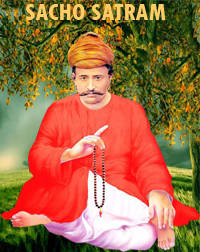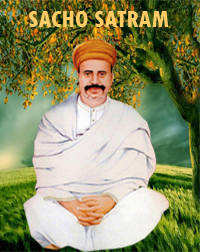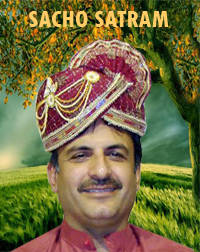In one of Hazir Swaroop Sai Sadhram Saheb’s insightful Satsangs, he explained why the great saints and Mahatmas are considered omniscient and omnipotent.
Saijan highlighted to his devotees that if we pay attention, we may notice that at times, these highly revered Sants and Mahatmas seem to already know what is on our minds when we visit them and guide us on what steps we should take.
Saijan emphasized that these highly revered Sants and Mahatmas possessed immense powers because they truly lived life in its deepest essence. They spoke sparingly, observed keenly, worked diligently, and gained profound understanding. Fully embracing life, they harnessed the full potential of their powerful minds with complete conscious awareness.
Saijan urged people to reflect on their tendency to judge others, take pride in pointing out others’ faults, and resist acknowledging their own mistakes, often resorting to arguments in self-defense.
Hazir Swaroop Sai Sadhram Saheb explained that most people act like lawyers for themselves, constantly arguing, making excuses, and manipulating situations to justify their actions. They rarely act as impartial judges of their own behavior, failing to observe and acknowledge the truth about their shortcomings or take responsibility for their mistakes.
On the contrary, people often prefer to defend themselves like lawyers. However, the great Sants and Mahatmas focused on self-improvement by reflecting on their own lives and actions. They consistently practiced introspection rather than passing judgment on others.
Through introspection and adopting the role of a judge for ourselves, we gain the positive strength needed for self-improvement and develop a strong character.
The great and highly revered Sants consistently lived a life devoted to seeking the truth and embodying it in their actions.
Hazir Swaroop Sai Sadhram Saheb reminded the people of the greatness of Shahanshah Satguru Sant Sai Satramdas Saheb and Sant Sai Kanwarram Saheb by citing examples of the profound Satsangs these revered Sants conducted, often lasting 6 to 8 hours without pause.
Saijan shared with the people that once, in the city of Machko, Shahanshah Satguru Sant Sai Satramdas Saheb’s Satsang continued uninterrupted for about 40 hours. Throughout this entire time, every person remained seated, completely absorbed. Not a single person moved, as they all listened intently to the divine and heavenly words of wisdom spoken by Satguru Sai, not wanting to miss even a single sacred word.
Hazir Swaroop Sai Sadhram Saheb beautifully helped the people understand the immense value of the boundless knowledge and profound wisdom of these great Sants. He explained that those who listened to them were so captivated by their words that they would not want to miss even a single piece of the wisdom imparted by these revered Sants.
Saijan remarked that nowadays, if you ask people about the great Sants and their Satsangs, they would focus solely on their physical activities. People would eagerly share details about where the great Sants went, whom they met, and what they did, but they rarely discuss the teachings imparted during their Satsangs, the wisdom shared, or the profound lessons conveyed through their precious Satsangs.
Saijan explained that the difference between most people and the great Sants lies in the fact that the Sants speak less and practice more, while most people talk extensively about knowledge and wisdom but fail to practice what they preach.
These great Sants acted as lawyers for others, but for themselves, they were judges. They engaged in deep introspection and preserved their sanctity. In contrast, most people in the world act as lawyers for themselves while playing the role of judges for others.
Saijan explained that we often refuse to accept our own faults and seize every opportunity to argue in our defense when blamed for our mistakes. However, when it comes to others, we quickly pass judgment, holding them accountable and blaming them without giving them a chance to prove their innocence if their mistakes are pointed out. This is the reason we struggle to improve and prosper in our lives. True progress can only be achieved when we honestly and humbly acknowledge our own mistakes.
We cannot improve or prosper if we do not acknowledge our mistakes as mistakes, our shortcomings as shortcomings, and our weaknesses as weaknesses.
When we fail to value the goodness in others and neglect to observe their qualities, it becomes challenging to transform ourselves into better human beings. By recognizing and accepting the goodness and talents in others, we subconsciously adopt those same qualities and virtues.
Hazir Swaroop Sai Sadhram Saheb emphasized that the great Sants and Mahatmas are always fully aware of their inner selves. The moment they notice anything negative within, they promptly uproot it, ensuring they always maintain their sanctity.
Saijan enlightened that people should engage in introspection, look within themselves, acknowledge their mistakes, and make sincere efforts to improve. True self-awareness and constant introspection lead to personal growth and purity. By promptly addressing and uprooting negativity within ourselves, we can maintain our sanctity and strive to become better human beings.
Sacho Satram



